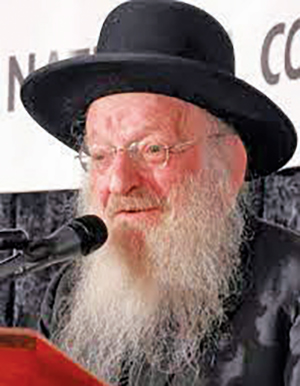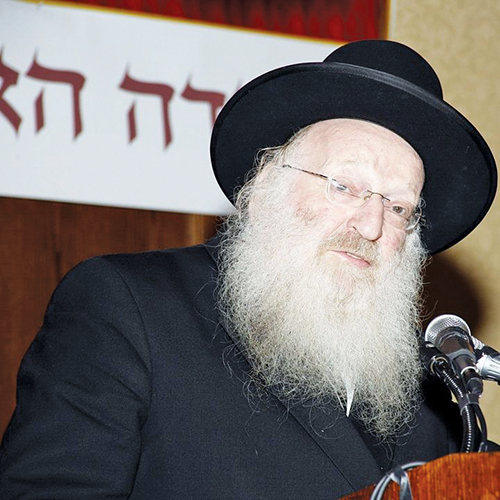
Rav Elya Ber Wachtfogel shlita, once observed his father, Rav Nosson Wachtfogel zt”l, the mashgiach of BMG in Lakewood, in a remarkable state of joy and simcha. Rav Elya Ber asked him, “What is the cause of such elation?”
Rav Nosson responded, “I am in a state of joy that the famed mashgiach of the Gateshead Yeshiva, Rav Matisyahu Solomon, will be joining us in the Lakewood Yeshiva. I anticipate great things to come, b’ezras Hashem, and that is why I am so happy.”
And great things did come. Great things that klal Yisroel will so sorely miss.
Rav Matisyahu, zt”l clarified matters of mussar and Torah to thousands and thousands of people and through his insights, knowledge and love, influenced us all. “What is the inyan of kavod HaTorah?” – he would ask. “Among other things, by us showing kavod to a person or to any other matter of Torah, we are machshir ourselves to become influenced by that person to receive a hashpa’ah from that person or from that matter of Torah.”
What is the idea of “Talmud meivi li’ydei maaseh – that studying Torah brings us to action?” It is only true if we approach it with “binas halev – understanding of the heart.” If we approach Torah like we would we would approach any other area of knowledge, chas v’shalom, it would have no impact.
Aside from his duties in the yeshiva, Rav Matisyahu, zt”l involved himself in communal matters and also with people, with individuals. He had a unique love of people. He motivated. He consoled. He stimulated. He inspired. And he advised.
He did it to talmidei chachomim. To kollel wives. He did it to tzubrocheneh mentchin, and he did it to everyday regular people.
A father had lost his precious child. He advised him to use his talents and abilities to help bring about greater emunah to klal Yisroel. He gave him brachos and encouragement. He told him, “I know you have the kochos to implement this project.” The man was simultaneously consoled and inspired.
The mashgiach once posed the question: The midrash tells us that Hashem posed the question to all of the other nations whether they wanted the Torah. They all inquired as to what was written in it. And most everyone is familiar with klal Yisroel’s answer of “Naaseh v’Nishma.” But what would have happened if klal Yisroel did not answer in this manner? What would have happened if we had said, “What is written in it?”
Rav Matisyahu Solomon, zt”l answered this question in the name of another one of his rebbeim, Rav Leib Gurvitz. He said that Hashem would have said the laws of lashon harah and rechilus are written in it. But if it was so hard, how then could we have managed to say, “Naaseh v’Nishma?” He answered that we knew that Hashem would give us the strength and capacity to overcome the everyday challenges involved. We have that ability within us–all of us have it.
What motivation! What inspiration! This was the mashgiach.

Rav Matisyahu had a unique ability to explain things with mosholim. In Parshas Behaaloscha, Rashi explains that Aharon HaKohain was deeply saddened that he did not partake in the dedication of the Mishkan like the Nesiim had done. Rav Matisyahu asked, “Why was Aharon HaKohain so sad? He had partaken in so many other mitzvos, even mitzvos that were uniquely his. And he had done so thousands of times! Why then was he so saddened?
Rav Matisyahu answered with a moshol. Imagine a man who had achieved arichas yamim of 100 years. He does not say, “Listen, I have lived 100 years and I have breathed so many times. What do I need to continue breathing for? To Aharon HaKohain, each unique mitzvah was life itself!”
This is the inspiration that we must all take from Aharon HaKohain’s reaction. Each mitzvah is as precious as life itself. Mitzvos are what power our lives.
Rav Matisyahu adopted the Kelm Mussar of his rebbe, Rav Elya Lopian. Kelm, of course, was the yeshiva where the Alter of Slabodka had studied, and the yeshiva where the Alter had sent Rav Yeruchem Levovitz. It was the yeshiva that was founded by Rav Simcha Zissel Ziv, zt”l, one of the primary students of Rav Yisroel Salanter, zt”l, who had started the Mussar Movement. Rav Matisyahu would explain that Rav Yisroel Salanter had conceived of the idea of “sfasayim dolkos – lips aflame.” That the study of mussar should be done in an emotional manner–with a unique sing-song so that the concepts and ideals of the mussar of Torah would penetrate the heart.
He himself studied mussar in this manner and tried to inspire others to do the same. He printed an article to this effect in the seventh volume of chizuk that is published by Dirshu (2007).
A number of years ago, at the dedication ceremony of the matzevah for the kedoshim that were murdered at Kelm, there was a gathering of mashgichim of all of the yeshivos. Rav Matisyahu sang the Adon Olam in such a tearful dirge–it was so tearful that there was not a dry eye at the gathering. And yet his Adon Olam conveyed such depth of emunah bashem that all present were deeply impacted as well. He sang it as well at the rededication of the matzevah for Rav Yisroel Salanter, zt”l, which had been re-found in the city of Koenigsberg which was in the former Germany, but is now in Russia.
Rav Matisyahu had once said that whoever says, “After the Holocaust, I stopped believing in Hashem,” is lying. He never had true emunah in the first place.” Someone asked Rav Chaim Kanievsky, zt”l about this and asked if it was halachically valid to the degree that his shechita would be pasul for all shechitas past. Rav Chaim responded that hakol lefi hainyan, which apparently meant that Rav Matisyahu did not mean absolutely everyone–it is just that the person is looking for an excuse.
Rav Matisyahu, zt”l absorbed and transmitted matters of mussar and inspiration from wherever he saw it. Even though he was from a thoroughly Litvish background, he imbibed yiras Hashem and ahavas Hashem from other Torah sources as well.
Once, while in Manhattan, he happened to meet the son-in-law of the author of the Nesivos Shalom. Excitedly, he told him, “I am not in the position to evaluate what [impact] that sefer has had on our generation, but I do know the incredible influence and effect it has had upon me personally. To this day, I have been thoroughly impacted by that remarkable sefer.”
Rav Matisyahu was not just the mashgiach of Beis Medrash Gavoah in Lakewood, he was all of Klal Yisroel’s mashgiach. He was the father, the zeide, and mashgiach, of us all, wrapped in one unique individual and personality, all in one. He will be sorely missed.
By Rabbi Yair Hoffman for the Jewish Home via vinnews.com
The author can be reached at yairhoffman2@gmail.com








